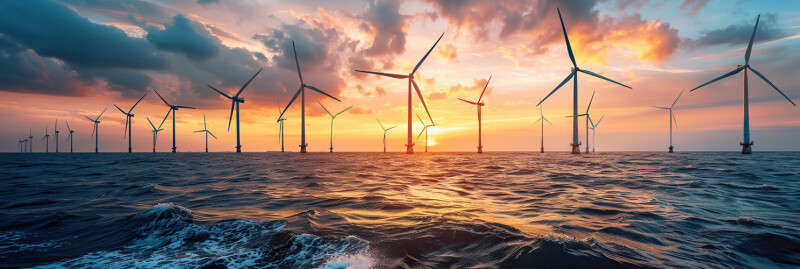Expanded offshore wind power is one of the many innovations that could help answer the challenges of climate change and energy transition. It is an international and national priority. However, waters within the three-mile boundary of the coastline fall under state jurisdiction, and states are taking a wide variety of approaches.
In December 2023, Louisiana’s Mineral and Energy Board approved two offshore wind developments in Louisiana waters.1 These represent one of the first non-federal efforts to develop an offshore wind industry. Louisiana is uniquely positioned to build out the nearshore industry and serve as an example for other states looking to pursue similar projects. Offshore wind could also provide revenue for Louisiana’s coastal restoration program if early projects are successful. However, the state has not clarified how it will regulate project siting, construction and operations. The lack of clarity and transparency in standards and processes are cause for concern for advocates of clean energy, waters and wildlife alike.
Regulatory Challenges for Offshore Wind in Non-Federal Waters
Several key federal laws, including the Endangered Species Act, Marine Mammal Protection Act and Migratory Bird Treaty Act, regulate environmental projects and demand standards of protection for species, habitats, people and public resources. Though these laws apply nationwide, they are not necessarily considered in depth when planning for private projects unless there is a connection with federal law, including through funding or regulatory oversight. For example, when the U.S. Army Corps of Engineers issues a permit under the Clean Water Act, it must ensure that the proposed permitted activity will not run afoul of federal conservation laws. These permits also undergo a threshold review under the National Environmental Policy Act and consultation with the U.S. Fish and Wildlife Service under the Endangered Species Act. Findings at this stage inform whether alternatives should be pursued or what mitigation measures will be incorporated into that permit’s requirements.
However, only about 3% of Army Corps permits undergo an individual review.2 The remainder fall under a pre-approved regional or nationwide permit, which covers a wide array of activities purported to have minimal adverse environmental impacts. There is a possibility that Louisiana’s early wind projects would fall under a pre-approved nationwide permit. Further, because Louisiana does not have robust statutory protections, there could be a missed opportunity to avoid or mitigate environmental harms with the siting and construction of nearshore wind turbines.
At the state level, the primary regulatory review of wind turbines that would apply to projects in state waters is through the Coastal Use Permit program, administered by Louisiana’s Department of Energy and Natural Resources (LDENR). These permits do not require the same scrutiny and assessment as federal permitting programs. Moreover, there is concern about the lack of comprehensive planning, environmental review, and public interest considerations in the state’s operating agreement process. It is unclear what studies and data led the state to select the coastal areas awarded in the operating agreements and the particular risks and benefits compared to other areas along the coast. Given the vast network of wells and pipelines across Louisiana’s coastal areas, there must be assurance that siting and infrastructure needs for wind do not increase risks posed by oil and gas operations.
Areas for Improvement
If Louisiana’s proposed projects do not undergo an individual review by the Army Corps, then there may not be another meaningful opportunity to analyze the impacts of the permitted activity on critical coastal habitats. Based on the current legal landscape, there is a particular concern about the impacts on wildlife and habitat in the nearshore area.
Wind energy will be a necessary component in the global fight to reduce greenhouse gas emissions. As the public has become more engaged on climate and energy issues, the offshore wind industry is under arguably greater scrutiny than other forms of alternative energy development. Given the recent, widespread misinformation that offshore wind turbines cause more harm to whales than traditional oil and gas,3 it will be necessary for the state to show it has the data and review mechanisms to ensure these projects are successful. Not only is it beneficial for impacted habitats and communities, but an established regulatory program for wind and other alternative energy will assist the state’s planning efforts and avoid conflict between different activities in state waters.
Offshore wind projects have a higher likelihood of succeeding and avoiding litigation if the state engages in a proactive review of environmental impacts. Several measures can help LDENR strengthen environmental stewardship and regulatory certainty:
- Engage with the Army Corps to discuss federal permitting review for species and habitat impacts to avoid later issues
- Prioritize finalizing wind leasing rules in state waters so there is a more formal process in lieu of operating agreements
- Increase transparency by making environmental studies and provisions of the insurance policies publicly available
- Allow for meaningful public comment, including ample notice and documentation for review on subsequent changes to operating agreements
That’s why Tulane and the National Wildlife Federation sought to find out what gaps exist in the planning, oversight, and regulation of Louisiana’s fledgling wind industry and address such gaps with good government approaches that position the industry for success. This report, “Offshore Wind in Louisiana Waters: Legal Framework for Environmental Review,” explores the array of environmental laws and regulations at both the federal and state levels that would likely apply to projects in state waters while also highlighting uncertainties in the current framework.
Study Environmental Law With Tulane Online
Tulane University’s online Master of Jurisprudence in Environmental Law gives you the tools and knowledge to stay ahead of ever-changing laws and regulations. Our program is taught by practicing legal professionals and experienced full-time Tulane Law School professors who understand environmental regulations’ nuances and complexity.
Also, explore our online Master of Jurisprudence in Energy Law, which focuses on the legal framework impacting the heavily regulated energy industry.
- Retrieved on August 19, 2024, from ajot.com/news/louisiana-signs-agreements-to-build-first-offshore-wind-farms-in-state-waters
- Retrieved on August 19, 2024, from everycrsreport.com/reports/97-223.html#Content
- Retrieved on August 19, 2024, from apnews.com/article/offshore-wind-whales-deaths-trump-5158af7f5bf0f5ef9e1530564ff791a9


